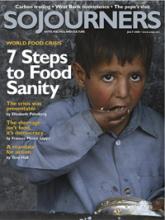For most of the past decade, the rock band Drive-By Truckers has woven a musical saga of white Southern working-class life from the inside out. In a series of albums that began in 2001 with Southern Rock Opera and ran through The Dirty South (2004), the Truckers inhabited the lives of a variety of low-grade, mixed-up tragic heroes—dispossessed farmers, old soldiers, and blue-collar family men share the stage with bootleggers, dope dealers, minor-league stock-car drivers, and small-town gangsters. All get their voice, all have their reasons, and none are judged. The Truckers seem determined only to capture what writer James Agee called “the cruel radiance of what is.”
Their most recent effort, Brighter Than Creation’s Dark, keeps the character-driven attention to detail of the Truckers’ earlier works, but drops the regional references, instead giving us 19 songs that add up to a portrait of a nation adrift and at war.
While the Truckers’ lyrics show the grain of white working-class life, the music captures the texture with a rough hillbilly rock sound that features a three-guitar attack, but one in which the third is often a country steel. Meanwhile, the extra grease on their backbeat betrays the ever-present influence of Southern soul.
The band’s principal songwriters (Patterson Hood and Mike Cooley) didn’t have to do much research to find the universal truths in the details of Southern lives, or Southern rock. They and the other band members are natives of the northwest Alabama Muscle Shoals region along the Tennessee River. It’s a poor and isolated corner of the South that in the 1960s and ’70s was home to a recording studio that produced legendary Southern soul records by the likes of Aretha Franklin, Wilson Pickett, and Percy Sledge. Duane Allman did session work at Muscle Shoals. The Rolling Stones recorded “Brown Sugar” and “Wild Horses” there.
Read the Full Article
